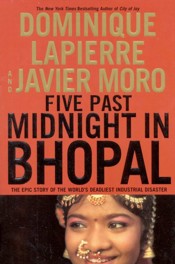Five Past Midnight in Bhopal: The Epic Story of the World’s Deadliest Industrial Disaster

This is kind of a weird book, because the title makes you feel like it’s going to be a minute-by-minute discussion of the chemical disaster in Bhopal.
But, it’s a 400-page book, and you don’t get to the disaster until about page 290. Seriously.
It starts with a discussion of insects and pesticides, then of how Union Carbide opened a plant in Bhopal. They were using it for cheap manufacturing – it was meant to provide a pesticide called Sevin to the Indian market. They original staffed it with Americans, with the goal of transitioning it to the Indians.
Then there was a drought, and Indian farmers couldn’t afford to buy pesticide. And they didn’t really need to, because nothing would grow.
So the factory got shut down – supposedly temporarily – and the original engineers left. What remained was a crumbling factory and engineers not totally trained on how to manage it.
Oh, and dozens of tons of hazardous chemicals in storage tanks.
One night, an engineer cleaned out some pipes with water. He was supposed to block off the pipe from the storage tanks with metal plates, but he didn’t. And there were other problems – some relief valves were blocked, the burn-off torch was broken, etc.
Water got into the storage tank, and this was a very, very bad thing. A chemical reaction started which produced a deadly gas. The pressure built up, pipes burst, and the factory vented gas into the night for hours.
The resulting cloud killed thousands. Officially, about 4,000. But for many reasons, the actual death toll was likely 10,000, and might have been as high as 30,000. No one really knows. In addition, tens of thousands of people ended up with damaged lungs and blindness.
Union Carbide maintained it was sabotage. Then they claimed that the Indian subsidiary had nothing to do with the global company.
They did pay damages at one point, but who knows how many of it got to the victims and their families. The CEO of Union Carbide tried to visit India, but was arrested, then let go and fled, promising to return for trial. He did not. He eventually went into hiding to avoid arrest and extradition while it was still a threat.
The book is a good accounting of the disaster, even if it does take a really, really long time to get around to it. It spends a lot of time talking about Indian culture, and the relationship of the Bhopali citizens to the factory and the company. You get to know several of the Indian citizens, which makes it even more tragic that the accident happened during a marriage festival.
It was a tragic situation, which I vaguely remember (I was…nine., I think?). There’s a discussion towards the end about corporate responsibility, and the book leaves lingering questions about what companies owe to the countries they operate in.
Book Info
- I have read this book. According to my records, I completed it on .
- A hardcover copy of this book is currently in my home library.